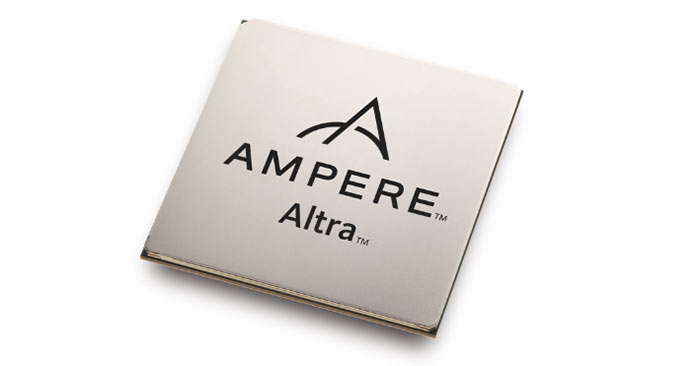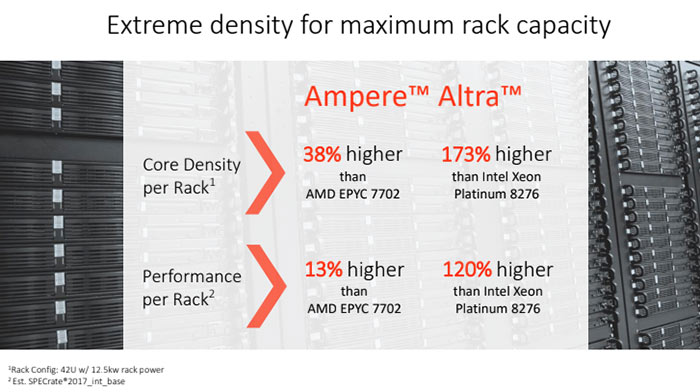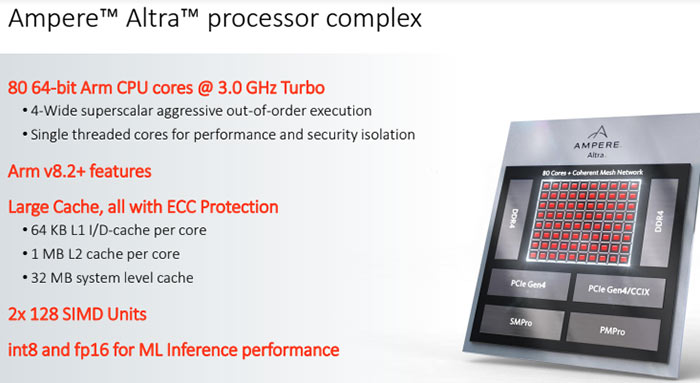Data centre chip startup Ampere, formed from the ashes of Applied Micro Circuits, today announced a processor that it says can outpace rival AMD Epyc and Intel Xeon 'Cascade Lake' server CPUs. Moreover, its Altra 80-core Arm server processor, built on TSMC's N7 process, is said to deliver this performance with greater efficiency. The Ampere Altra 210W CPU is now sampling with technology heavyweights like Microsoft and Oracle and will be made available in single and dual-socket platforms. Mass production is scheduled for mid-2020.

Renee James, the Ampere Founder and CEO, is a former Intel President. James says that the new Ampere Altra has been designed to excel in cloud and edge workloads. Specifically, the Ampere Altra is claimed to be "the industry's first 80-core, cloud native microprocessor".

So, what is different about the Ampere Altra and makes it a better choice for cloud and edge processing than the likes of the AMD Epyc or Intel Xeon? According to the Ampere press release, the way that the cloud utilises processor performance, security and power efficiency is vastly different to more traditional enterprise data centre environments. Getting a bit more technical, Atiq Bajwa, Ampere's CTO and chief architect provided some insight to the Altra's operation. Bajwa explained that Ampere Altra's single-threaded cores, and the dense, power-efficient servers they make possible can deliver "reliable, sustained performance and high levels of isolation and security to each customer, irrespective of what other tenants may be running in multi-tenant environments". The 64-bit Ampere Altra is based upon Arm's Neoverse N1 platform. It will be put into single and dual-socket platforms.
Ampere Altra features:
- Up to 80 single-threaded cores in a 1P and 160 cores in a 2P platform
- 7nm process technology
- 8 channels of DDR4-3200 at 2 DPC, supporting up to 4 TB memory per socket
- 128 PCIe Gen4 lanes in 1P and 192 PCIe Gen4 lanes in 2P platforms
- CCIX for coherent accelerator attach
- Two 128 bit SIMD units
- AI inference acceleration using int8 and fp16 instructions
- Server class RAS
- Arm v8.2+, SBSA Level 4

Microsoft is evaluating Ampere's chips in its labs with a view to using them to power Azure cloud services. Meanwhile, Oracle is planning to use Ampere chips in its cloud services and is optimising much of its software, including Oracle Linux, Oracle Java, and Oracle Database, to run on the Altra. Oracle has previously invested $40m in Ampere. Ampere's press release contains further big-hitting testimonials from the likes of Canonical, VMware, Lenovo, Micron, and Gigabyte.
The last time Ampere was in the HEXUS news was back in September 2018 when it launched the 32-core eMAG platform. Proponents of Arm processors have been trying to muscle into the lucrative server space for at least a decade. Will the Ampere Altra 80-core Arm server processors (or Amazon's Arm Neoverse-core based Graviton2 processors) be the first to really make an impact?













